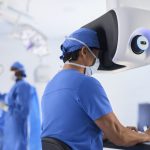
- AI
Microsoft AI System Outperforms Doctors with 80% Accuracy
5 minute read

Microsoft’s healthcare AI system reduces diagnostic costs while achieving unprecedented accuracy rates in complex medical cases
Key Takeaways
- 80% diagnostic accuracy achieved: Microsoft’s MAI Diagnostic Orchestrator correctly diagnosed complex medical cases four times more often than experienced physicians, who achieved only 20% accuracy in the same study.
- 20% cost reduction demonstrated: The AI system reduces healthcare expenses by selecting less expensive diagnostic tests while maintaining superior accuracy, addressing rising healthcare costs globally.
- 50 million daily health sessions: Microsoft’s existing AI products including Bing and Copilot already handle massive healthcare query volumes, positioning the company to scale medical AI across consumer and clinical markets.
Introduction
Microsoft achieves a breakthrough in medical artificial intelligence with a system that diagnoses complex health conditions more accurately than human doctors. The company’s MAI Diagnostic Orchestrator (MAI-DxO) correctly identifies patient conditions 80% of the time, compared to 20% accuracy for practicing physicians working independently.
This development represents what Microsoft CEO Mustafa Suleyman calls “a genuine step toward medical superintelligence.” The system tackles diagnostically complex cases that challenge experienced medical professionals, using advanced AI models to mimic expert physician decision-making processes.
Key Developments
Microsoft’s AI unit developed the diagnostic system under the leadership of British tech pioneer Mustafa Suleyman. The MAI-DxO integrates multiple AI models, including OpenAI’s advanced o3 system, to function like a virtual panel of medical experts analyzing patient cases.
The system underwent rigorous testing using case studies published in the New England Journal of Medicine. These complex patient scenarios were converted into interactive diagnostic challenges called the Sequential Diagnosis Benchmark, evaluating AI models from major tech companies including OpenAI, Meta, Anthropic, and Google.
Microsoft configured the system to operate within defined cost constraints, exploring cost-value trade-offs in diagnostic decision-making. This approach delivers both higher diagnostic accuracy and lower testing expenses compared to traditional medical workflows.
Market Impact
The healthcare AI market responds positively to Microsoft’s advancement, with industry analysts viewing the technology as a catalyst for precision medicine growth. The global healthcare AI diagnostics sector expects significant expansion as organizations seek solutions for workforce shortages and rising costs.
Microsoft leverages its existing healthcare presence, with current AI products processing over 50 million health-related queries daily through Bing and Copilot. This established user base provides a foundation for scaling advanced diagnostic capabilities to consumer and clinical markets.
The 20% cost reduction achieved through optimized test selection addresses critical healthcare economics. Healthcare systems worldwide face unsustainable cost increases, making Microsoft’s efficiency gains particularly valuable for hospital networks and insurance providers.
Strategic Insights
Microsoft positions itself as the leading healthcare AI provider by combining diagnostic accuracy with cost efficiency. The company’s strategy integrates cloud infrastructure, AI partnerships, and clinical expertise to capture market share in the rapidly expanding healthcare technology sector.
The diagnostic orchestrator creates competitive advantages across multiple healthcare segments. Consumer applications through search engines help individuals understand symptoms, while clinical tools provide advanced decision support for complex medical cases.
Healthcare organizations benefit from reduced clinician burnout and improved patient outcomes. The AI system handles routine diagnostic tasks, allowing medical professionals to focus on complex cases requiring human judgment and patient interaction.
Expert Opinions and Data
Mustafa Suleyman, CEO of Microsoft’s AI division, emphasizes the transformative potential of the technology. “This represents a genuine step toward medical superintelligence,” he states, highlighting the system’s ability to surpass human cognitive abilities in specific medical tasks.
The research demonstrates measurable improvements over existing AI testing methods. Microsoft questions traditional AI evaluation approaches like the United States Medical Licensing Examination, suggesting these formats may inflate AI capabilities without reflecting real-world diagnostic scenarios.
Clinical validation remains essential before widespread deployment. The Guardian reports that Microsoft acknowledges the need for extensive clinical trials to evaluate real-world performance before public release.
Industry experts stress the importance of trust, transparency, and regulatory compliance. Healthcare AI adoption depends on demonstrating safety, reliability, and explainability in actual clinical environments rather than controlled research settings.
Conclusion
Microsoft’s diagnostic AI system establishes new benchmarks for medical technology performance while addressing critical healthcare challenges. The combination of superior accuracy and cost reduction creates compelling value propositions for healthcare providers facing operational pressures.
The company’s comprehensive approach spans consumer tools and clinical applications, leveraging existing market presence to accelerate adoption. Success depends on navigating regulatory requirements and building trust among healthcare professionals and patients through continued research and real-world validation.







